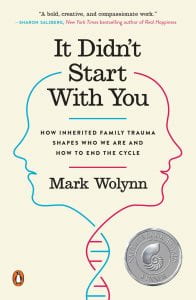Life can be very challenging and unpredictable, yet we live through it despite the problems. It is inevitable that we will not always be happy as we wish to be. There will be times we encounter issues, and times we enjoy our lives. However, there are problems that do not always manifest themselves easily but are nested inside our mind waiting for the right time to come out. As might be expected, unfortunately, some of us are facing these psychological problems and still have not got a clue of a trauma that is a generational problem.
 Recent studies in trauma published by Mark Wolynn in his book It Didn’t Start With You have opened our minds to understand that trauma might not solely originate from us but may have been endured by our parents or even our grandparents, which we then inherited from them. If it occurs, this phenomenon would be due to the epigenetic effect, heritable changes in gene expression without a change the DNA sequences. Greater understanding in genetics has brought to light that our phenotypes, the observable characteristics such as eye colours, emotions and behaviours, are shaped by coding and noncoding DNA. Surprisingly, it appears that coding genes only make up to less than 2% of our DNA whilst the rest is noncoding, commonly called ‘Junk DNA’, which was originally described to be useless.
Recent studies in trauma published by Mark Wolynn in his book It Didn’t Start With You have opened our minds to understand that trauma might not solely originate from us but may have been endured by our parents or even our grandparents, which we then inherited from them. If it occurs, this phenomenon would be due to the epigenetic effect, heritable changes in gene expression without a change the DNA sequences. Greater understanding in genetics has brought to light that our phenotypes, the observable characteristics such as eye colours, emotions and behaviours, are shaped by coding and noncoding DNA. Surprisingly, it appears that coding genes only make up to less than 2% of our DNA whilst the rest is noncoding, commonly called ‘Junk DNA’, which was originally described to be useless.
Several factors have been identified to influence the epigenetic mechanism which in this case is due to environmental stressors including stressful emotions. Environmental variation can signal the gene to be modified with the attachment of epigenetic tags such as DNA methylation which effectively activating or silencing a specific gene. To put it simply, a daughter cell can have the ability to retain the patterns of a parent cell’s gene expression without altering the genetic makeup thus having some similar phenotype as the parent. On the other hand, the expression of genes can also be silenced leading to the termination of specific traits which appears phenotypically different from those on the parent.
When our mothers were inside our grandmothers’ wombs, the egg cells that formed us were already developed in our mothers’ ovaries. It is shocking to think that three generations can be brought together in a biological environment, yet this genetic event has allowed the passage of one generation’s nightmare to the next. In one case study, an anonymous patient always feels she wanted to vaporise herself. A series of investigation later revealed that her grandmother was a Holocaust survivor whose entire family have been brutally killed. Now she knows where the source of her trauma may come from, allowing her to take the necessary steps to recover. This has provided vivid evidence of how trauma can be an inherited beast which, unnoticed, will bring suffering to one’s life and continue to do so endlessly.
The idea of trauma extending to subsequent generations must be taken seriously. There may be certain conditions that we have no idea about experienced by previous generations which induce trauma. It can be any occurrence perceived as undesirable and hurting to the extent where prolonged exposure to such circumstances has rooted it in place into thought and habit. However, it seems that we have the choice whether to change how we perceive and face the trauma, or stand still and let it channel to our successor.
If we sit still and ponder for a second what we feel when we experience trauma, do we ever think that what we felt is what our parents or grandparents felt too? To truly understand the awful feelings that have caused misery to our lives, we should also understand that our parents may have felt the same way too. When we reach a certain age or face certain conditions that could awaken the dormant traumatic state, we might not realise where our emotion that may translate into behaviours comes from. We think that having the trauma is bad enough and none would understand what we felt. Apparently, we need to realise that the generations before us may have had the same experience too.
This knowledge can enlighten us to how our parents might have felt when they lived with the trauma. They may have felt lonely, ignored or abandoned in a certain part of their lives. Each of us may have an inherited family trauma, whether noticed or remained quiescent, to be discovered. This does not mean all the difficulties we face were faced by our parents. It may just be a very exclusive bad experience – a crime, a sudden loss or the death of someone they loved – that has firmly established itself. Understanding is the key – and to understand further, immerse yourself in the book: It Didn’t Start With You by Mark Wolynn.
Editor’s note: Mark Wolynn has a psychology and English degree and his graduate education was in English, not science. He appears to have no genetics-related qualifications and runs a fee-paying institute. The idea is interesting, but we have not been able to find any peer-reviewed papers backing up the claims made here: the degree to which Wolynn’s claims are backed by science is not clear.

